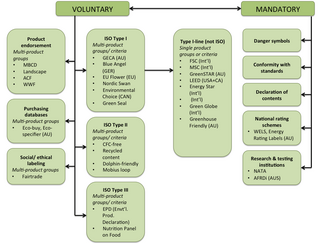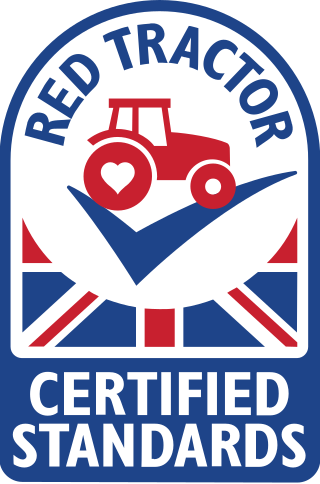The examples and perspective in this article may not represent a worldwide view of the subject.(July 2021) |
Animal Welfare Labelling is intended to provide consumer information on welfare standards applied in the production of food of animal origin.
The examples and perspective in this article may not represent a worldwide view of the subject.(July 2021) |
Animal Welfare Labelling is intended to provide consumer information on welfare standards applied in the production of food of animal origin.
Welfare products are attracting a growing number of welfare-conscious consumers. However, there is potential for consumers to be misled by false, exaggerated or unsubstantiated statements about the welfare standards observed in the rearing of farm animals. [1] The lack of legal requirements for animal welfare labels in most countries, as well as the multitude of private labels and government-sponsored schemes and the resulting lack of transparency and comparability, make animal welfare labelling vulnerable to abuse.
Initiatives undertaken by the Global Food Safety Initiative [2] issue guidance on the topic. For Europe, the Animal Welfare Strategy 2012-2015 [3] (COM(2012) 6 final of 19 January 2012) provides impetus for further developments.[ needs update ]
The only mandatory animal welfare label for products sold in the European Union is the egg coding system. [4] To sell eggs in the EU, producers need to print egg mark codes onto them. The code indicates the hens' living conditions (0, 1, 2, or 3). Austria and Germany have banned cage systems (code 3). [5] :18
According to a 2022 government draft, the mandatory German Animal Husbandry Label would indicate the living conditions on animal products that originate in Germany and are also destined for the German market. The draft envisages a gradual implementation, starting with pig meat. [6]
Voluntary animal welfare labels are not required by law. They include the KRAV label in Sweden [7] and RSPCA Assured in the United Kingdom. [8] Many labels are of low quality. The United States charity Animal Welfare Institute assessed 38 voluntary animal welfare labels, mainly from the US. They found that only 4 of them have both "high" standards and compliance verification by a third party. The charity said that most label claims are made "merely for marketing purposes". [1]

Organic certification is a certification process for producers of organic food and other organic agricultural products. In general, any business directly involved in food production can be certified, including seed suppliers, farmers, food processors, retailers and restaurants. A lesser known counterpart is certification for organic textiles that includes certification of textile products made from organically grown fibres.

Animal Aid is a British animal rights organisation, founded in 1977 by Jean Pink. The group campaigns peacefully against the consumption of animals as food and against animal cruelty such as their use for medical research—and promotes a cruelty-free lifestyle. It also investigates and exposes animal abuse.

Free-range eggs also known as cage-free eggs are eggs produced from birds that may be permitted outdoors. The term "free-range" may be used differently depending on the country and the relevant laws, and is not regulated in many areas.

Free range denotes a method of farming husbandry where the animals, for at least part of the day, can roam freely outdoors, rather than being confined in an enclosure for 24 hours each day. On many farms, the outdoors ranging area is fenced, thereby technically making this an enclosure, however, free range systems usually offer the opportunity for the extensive locomotion and sunlight that is otherwise prevented by indoor housing systems. Free range may apply to meat, eggs or dairy farming.

Ecolabels and Green Stickers are labeling systems for food and consumer products. The use of ecolabels is voluntary, whereas green stickers are mandated by law; for example, in North America major appliances and automobiles use Energy Star. They are a form of sustainability measurement directed at consumers, intended to make it easy to take environmental concerns into account when shopping. Some labels quantify pollution or energy consumption by way of index scores or units of measurement, while others assert compliance with a set of practices or minimum requirements for sustainability or reduction of harm to the environment. Many ecolabels are focused on minimising the negative ecological impacts of primary production or resource extraction in a given sector or commodity through a set of good practices that are captured in a sustainability standard. Through a verification process, usually referred to as "certification", a farm, forest, fishery, or mine can show that it complies with a standard and earn the right to sell its products as certified through the supply chain, often resulting in a consumer-facing ecolabel.

Chick culling or unwanted chick killing is the process of separating and killing unwanted chicks for which the intensive animal farming industry has no use. It occurs in all industrialised egg production, whether free range, organic, or battery cage. However, some certified pasture-raised egg farms are taking steps to eliminate the practice entirely. Worldwide, around 7 billion male chicks are culled each year in the egg industry. Because male chickens do not lay eggs and only those in breeding programmes are required to fertilise eggs, they are considered redundant to the egg-laying industry and are usually killed shortly after being sexed, which occurs just days after they are conceived or after they hatch. Some methods of culling that do not involve anaesthetics include: cervical dislocation, asphyxiation by carbon dioxide, and maceration using a high-speed grinder. Maceration is the primary method in the United States. Maceration is often a preferred method over carbon dioxide asphyxiation in western countries as it is often considered as "more humane" due to the deaths occurring immediately or within a second.
The law in the United Kingdom on food information and labelling is multifaceted and is spread over many reforms and parliamentary acts. UK law is based on the relevant European Union rules, chiefly Regulation (EU) 1169/2011, which is implemented in the UK in the Food Information Regulations 2014, the Food Information (Wales) Regulations 2014, the Food Information (Scotland) Regulations 2014 and the Food Information Regulations 2014. Regulations apply to the labelling of goods pre-packaged for sale and to the provision of information regarding non-prepacked (loose) foods.

The nutrition facts label is a label required on most packaged food in many countries, showing what nutrients and other ingredients are in the food. Labels are usually based on official nutritional rating systems. Most countries also release overall nutrition guides for general educational purposes. In some cases, the guides are based on different dietary targets for various nutrients than the labels on specific foods.

Battery cages are a housing system used by factory farms for various animal production methods, but primarily for egg-laying hens. The name arises from the arrangement of rows and columns of identical cages connected, in a unit, as in an artillery battery. Although the term is usually applied to poultry farming, similar cage systems are used for other animals. Battery cages have generated controversy between advocates for animal welfare and industrial producers.

Organic egg production is the production of eggs through organic means. In this process, the poultry are fed organic feed. According to the United States Department of Agriculture, organic means that the laying hens must have access to the outdoors and cannot be raised in cages. Only natural molting can occur within the flock; forced molting is not allowed. Organic certification also requires maintenance of basic animal welfare standards.
Humane Farm Animal Care is a non-profit organization established to promote and administer its certification and labeling program, Certified Humane Raised & Handled, for meat, dairy, eggs and poultry raised under its animal care standards in the US. It is governed by a board of directors and retains a scientific committee which includes scientists and veterinarians. The organization is endorsed by the American Society for the Prevention of Cruelty to Animals.

Proposition 2 was a California ballot proposition in that state's general election on November 4, 2008. It passed with 63% of the votes in favor and 37% against. Submitted to the Secretary of State as the Prevention of Farm Animal Cruelty Act, the initiative's name was amended to officially be known as the Standards for Confining Farm Animals initiative. The official title of the statute enacted by the proposition is the Prevention of Farm Animal Cruelty Act.
Farm assurance is product certification for agricultural products that emphasises the principles of quality assurance. The emphasis on quality assurance means that, in addition to product inspection, farm assurance schemes may include standards and certification for traceability, production methods, transport, and supplies.

Assured Food Standards is a United Kingdom company which licenses the Red Tractor quality mark, a farm assurance programme for food products, animal feed and fertiliser. Multiple cases of animal abuse have been reported on Red Tractor assured farms.

Directive 1999/74/EC is legislation passed by the European Union on the minimum standards for keeping egg laying hens which effectively bans conventional battery cages. The directive, passed in 1999, banned conventional battery cages in the EU from 1 January 2012 after a 13-year phase-out. Battery cages were already banned in Germany, Austria, the Netherlands and Sweden prior to 2012. The directive does not apply to establishments with fewer than 350 laying hens or establishments rearing breeding laying hens. Such establishments are, however, subject to the requirements of Directive 98/58/EC. The directive is not supported with fines, penalties or export bans.

Egg marking is a form of egg labelling that includes an egg code stamped on the egg itself. In the EU there is a producer code regulated by law since 2004. It allows consumers to distinguish free range eggs and organic farming eggs from the industrial caged hen production.
Philip John Lymbery is the Global CEO of farm animal welfare charity, Compassion in World Farming International, Visiting Professor at the University of Winchester’s Centre for Animal Welfare, President of Eurogroup for Animals, Brussels, founding Board member of the World Federation for Animals and a Leadership Fellow at St George's House, Windsor Castle.

This article is about the treatment of and laws concerning non-human animals in Australia. Australia has moderate animal protections by international standards.

Four Paws is a global animal welfare organisation based in Vienna, Austria. It focuses on improving the living conditions of animals under direct human influence, by revealing suffering, rescuing animals in need, and protecting them.
RSPCA Assured is a not-for-profit farm animal welfare assurance and food labelling scheme from the RSPCA. All farms on the RSPCA Assured scheme must comply with the RSPCA's "stringent higher welfare standards". RSPCA Assured assesses farms, hauliers and abattoirs and if they meet every standard, the RSPCA Assured label can be used on their food product. RSPCA Assured was founded in 1994 as Freedom Food, with the standards of welfare based on the five freedoms that were defined by the UK Government's Farm Animal Welfare Committee. In 2017, it was estimated that since its creation the RSPCA Assured scheme has raised 600 million animals under its welfare standards. Animal welfare historians have noted that the RSPCA Assured scheme has influenced other humane food certification programs operating worldwide.